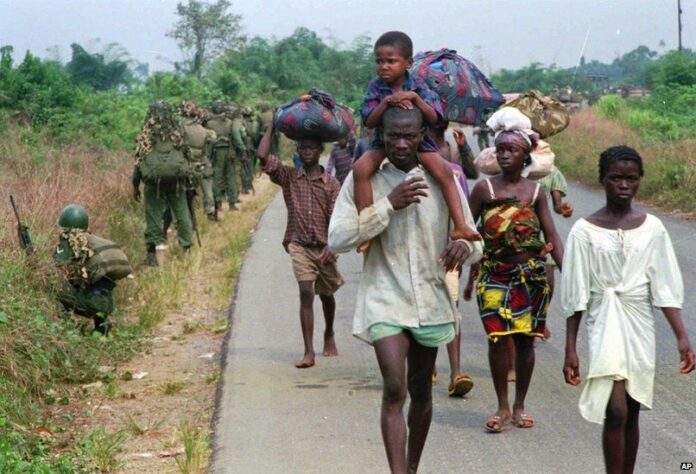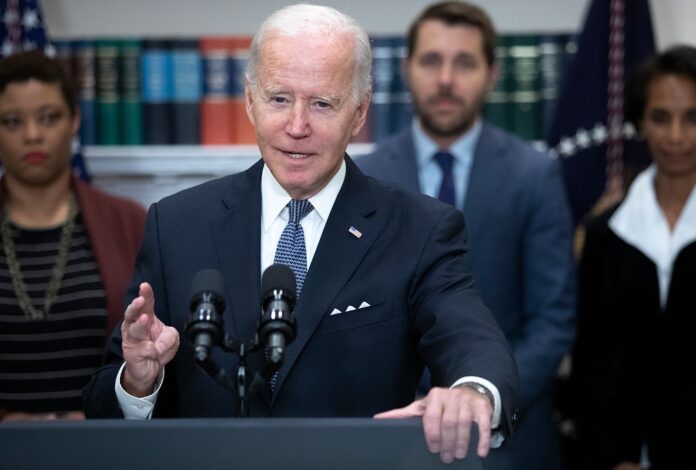By Charles Gurney
War came to Liberia on Christmas Eve, 1989. The new decade swept in like a hurricane—uprooting people, cities, entire cultures. It was unleashed by Charles “Gankey” Taylor, a former minister of finance, under President Samuel Doe, who had fled to the United States in 1986 after his corruption was exposed. Taylor was arrested in Massachusetts but escaped out a window by tying bedsheets together. When he returned to Liberia through the jungle in remote Nimba County, he was accompanied by Libyan-trained fighters and pursued a personal vendetta against Doe.
The safety of American citizens was U.S. Embassy Monrovia’s first concern. More than 5,000 resided in every corner of Liberia, including Peace Corps volunteers, missionaries, and USAID contractors. The missionaries’ radio network was indispensable in spreading word of the incursion and beginning successive waves of evacuations. Sometimes, a personal appeal was needed.
Embassy calls for Americans to leave became more urgent as the incursion swelled into a regional rebellion. Doe’s army swarmed into villages along the border and indiscriminately slaughtered members of the Gio ethnic group suspected of aiding Taylor, who claimed dubious ties to the tribe. Gio men flocked into Taylor’s camp, driven by revenge and ancient ethnic hatreds. In Monrovia, an eerie calm prevailed. It would take months for the city to dismiss the government propaganda that the incursion posed no threat, and realize the country was being destroyed.
As the political/military officer at the embassy, I was responsible for compiling the daily situation report to Washington. Contacts were often impossible to reach, and my military contacts were wary of the U.S. government’s refusal to fully support Doe’s bloody response to the incursion. I ran into an influential Liberian general I regarded as a friend on the street in Monrovia.
“When is the U.S. coming to help us?” he implored.
“General, we can’t help when the army is committing atrocities in Nimba County,” I responded.
“But they are rebels, armed by Libya!”
“They became a threat because their families were killed. Why does the army have to kill all of the women and children?”
“You don’t understand,” he said quickly and frankly. “They are all enemies. The women have children, who grow up to be fighters. The old people take care of the children and teach them to hate. They are all enemies.”
There were no good guys in this fight, and the State Department advocated a regional response. But embassy personnel would get used to the plea—no, the expectation—that the “American father” step in and stop the tragedy. The belief in U.S. omnipotence encouraged complacency among some long-term residents who had lived through the coup in 1980, when Sergeant Doe took power and executed the former ministers on the beach via firing squad.
It would take months for the city to dismiss the government propaganda that the incursion posed no threat, and realize the country was being destroyed.
As stories from the front filtered back to Monrovia, fear finally descended on the city. Relatives told of whole villages wiped out. Children were being recruited, many recently orphaned, and they expressed slavish devotion to Gankey Taylor. Fleeing villagers described drugged rebel soldiers fighting fearlessly because they were immune to bullets. The famous “Commander Buck Naked” augmented these powers by charging into battle sans clothing. These tales continued, largely owing to the inept marksmanship of the Liberian army, and helped build fear and support for Taylor’s forces, who were also guilty of ethnic atrocities against the ruling Krahn tribe.
Exit from Liberia was becoming increasingly hazardous. Roberts International Airport was still open, but few flights operated. The embassy was advising Americans to leave immediately. The Peace Corps had been evacuated weeks before, and most missionaries had withdrawn into Monrovia. Liberia was collapsing. My hopes and dreams of living in authentic Africa were replaced with a fear that traditional Africa would not survive. When our own families were evacuated and most embassies closed, Liberians who could afford to leave fled the country.
But not all of them. Kevin, a former Peace Corps volunteer in his 50s, married to a Liberian woman and with several young children, lived in a small village outside Tapita, a city that would soon face the rebel advance. The consular section knew of him, but he had “gone native” and did not respond to embassy warnings. I teamed up with Consular Officer John Desrocher to make the dangerous trek into the interior with a last-minute appeal.
We left Monrovia in the early morning, worried more about government troops at the many checkpoints than the threat of rebels. Our white Suburban with tinted windows immediately identified us as an official vehicle, and we weren’t popular among the government forces; the U.S. defense attaché had recently been kicked out of the country. Before turning off Liberia’s only paved road into Bong County, I had to pay my respects to a Liberian colonel who was leading Liberian troops upcountry. I needed information about any remaining Americans in the region, but I hoped to get a firsthand look at the government’s defenses.
We could tell immediately that we were not welcome in the Liberian army camp. All talk stopped as we approached the colonel, who was sitting with his top advisers in a clearing. The bottle of Scotch I proffered, normally a suitable gift to break the ice with Liberian officers, was not well received. He glared at me.
“We don’t drink here,” he stated through bleary and suspicious eyes. It would have been a poor time to engage in a discussion of the conflict. John asked if he knew of any resident Americans in the area, but he dismissed us with a wave. Many of the soldiers were in rags, some were bandaged. Morale was clearly low. The war was close. We made a hasty exit.
While many Liberians had embraced the invading rebels, discipline in the rebel ranks declined as their numbers grew. As cultural norms disintegrated, traditional African secret societies like the Poro, which serve as nongovernmental governing bodies, crumbled. Government authority fled, and schools hadn’t operated in months. Society had broken down, and chaos reigned. Many armed orphans and youth raised in a kleptocracy valued only money. “Now is the time when things are free,” one AK-toting kid told me when I asked where he got his tape recorder.
John and I confirmed the directions to Kevin’s village with a Lebanese shopkeeper in Tapita, which was almost deserted. We hoped Kevin and his family would choose to leave immediately, and we were prepared to take the whole family in the Suburban if needed. But nobody from the embassy had seen Kevin in a couple years.
The road to his village was abysmal, like most roads in Liberia, and was probably impassable in the rainy season. The village was very old, as evidenced by the erosion around the thatched roof huts. Few villages upcountry had electricity or running water, but this one looked especially impoverished. It seemed empty, but villagers feared outsiders and probably had fled into the forest; officials who roared up in trucks typically collected taxes and took away young men to join the army.
We found Kevin surrounded by his children in front of his mud wattle hut. He seemed impressed, even amazed to see us, and became a bit self-conscious about his appearance. With long straggly hair and beard, he looked much older than 50, naked except for a pair of ragged shorts. He seemed to live as other villagers without modern conveniences and had no communication with Monrovia.
I explained that rebels were advancing toward his village as we spoke. The situation was extremely dangerous, and options to get out were closing fast. John explained that the U.S. government would arrange for his whole immediate family to leave and cover the expense if needed. Kevin nodded but said nothing for a while.
“I’ve been here 20 years,” he began. “This is my home, the only place my family has ever known. I’ve been through lots of turmoil, coups, tribal wars. I’m not leaving.” His wife listened silently in the doorway.
“It’s different this time,” I anxiously tried to explain. “This isn’t just a replacement of government. It’s civil war of the worst kind. Death has become casual, and a U.S. citizen can be targeted for cash or ransom. Your entire family is in grave danger!”
John added his appeals, relaying stories that came back to Monrovia from the killing fields. We stressed that there was little time to consider options. We had no access or contact with those behind rebel lines; and within days that would include his family. He was unmoved. I could see that the thought of returning to the U.S. had little appeal to him.
My hopes and dreams of living in authentic Africa were replaced with a fear that traditional Africa would not survive.
John and I returned to Monrovia in silence. Our mission was a failure, and we felt defeated. But there was no time to worry about Kevin’s fate. Liberians’ pleas quickly changed from “stop the war” to “help us escape.” All embassies except the U.S. embassy had left; the Brits dropped off the keys to their adjoining compound on Mamba Point on their way out. The remaining Americans were usually of mixed origin, their stories murky. Kids who were born in America but never lived there suddenly acquired huge families who all demanded evacuation. Lebanese traders reluctant to leave their life’s work, stranded Europeans, missionaries who stayed to minister to Gios hiding in Monrovia, all descended on the U.S. embassy.
Several embassy colleagues broke down in tears as the stress of living in a sea of desperation overcame them. Local employees and contacts went missing, and the embassy housing compound was overrun by Liberians seeking some measure of safety. About two dozen Liberians lived in my carport, eking out nutrition from the garden my wife had started. My Gio housekeeper and her children lived in a spare bedroom, and my Guinean tailor, who turned out to be a valuable scout, lived on my back porch with his mother. They would soon flee the city.
There was no water or electricity in Monrovia. At night, I would sometimes lay on the roof, and watch the tracer bullets overhead. Trucks would snake out of the grounds of the executive mansion, which provided the only lights in a blacked-out city. The president hid behind his loyal Krahn guards who would prowl through the streets and arrest “rebel sympathizers,” who were never seen again.
One night, embassy personnel listened in on our radio network as a priest at the Don Bosco Catholic Training Institute described a visit by soldiers to their compound. The priests were sheltering dozens of terrified Gio people and refused entry to the troops. The furious soldiers said they would return with more weapons and men and kill all the occupants of the compound. It had happened at a church a few nights earlier, a grisly mass killing of more than 200 Gio people that finally made the news in the U.S. We listened in tears as the priests gave instructions for contacting their loved ones. But the troops did not return.
A Marine Armed Readiness Group (MARG) had taken up position just over the horizon, and it became our only escape option. When Prince Johnson, one of several warlords, occupied Mamba Point, alarm bells went off. Johnson’s troops now surrounded the embassy. He had made no hostile moves, but clearly intended to use his position. When he threatened to take American hostages, the MARG swung into action. We cut down the basketball goals to make a landing pad for the helicopters, and I was evacuated along with hundreds of foreigners the very next day. A small contingent, including our outstanding Chargé D’Affaires Dennis Jett, remained as the only official foreign presence in the country.
It took a while to get over the trauma of the Liberian Civil War. I would sometimes go on a crying jag for no apparent reason, and I suspect I suffered from PTSD. I was overjoyed to be reunited with my family, yet strangely alienated by normality. I wanted to put the conflict behind me, but I felt drawn to it like a suffering child. I now worked a nice, calm job in the State Department’s oceans and environment bureau, and mourned for a destroyed country, and my own destroyed idealism about Africa. After a year, I was recruited to be the new desk officer for Liberia, a promotion I accepted with some reluctance.
Things hadn’t really changed much. Johnson had killed President Doe, but fighting continued and had recently spread to Sierra Leone. The State Department was promoting a peace process, but many grim years lay ahead. The insertion of an African peacekeeping force had prevented Taylor from taking Monrovia, but he would eventually be elected president before being tried and imprisoned by the International Criminal Court for war crimes.
I got lots of calls from the public, often accusing the U.S. of abandoning Liberia. So I was surprised to get one from California, which began, “I want to thank you for saving my life.” It was Kevin, who had fled his village with his family of five the day after our visit. His wife had convinced him to leave, he said, arguing that those American men would never venture so far into the bush unless the danger was real. He had resettled in Los Angeles, where he was doing well but having trouble adjusting. He asked for John Desrocher’s contact info so he could thank him, as well.
Much of the U.S. embassy’s work overseas is unknown and unappreciated. We often don’t get to see the results of our efforts, or even know whether they mattered. It was a high point of my career to learn that sometimes they do.
Charles Gurney joined the Department of State in 1984 and served primarily in Africa during a 32-year Foreign Service career. He currently lives in Knoxville, Tennessee. Source: afsa.org







